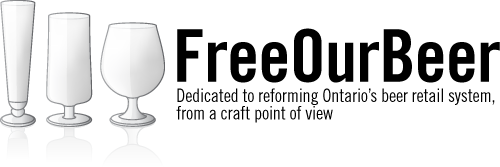With the great news from the LCBO that IIPA was accepted into the fall release, came the great unknown. What was next? I assumed paperwork, and I was correct.
Shortly after I received acceptance from the LCBO, I was informed of the paperwork that needed to be completed. There were three primary forms: the “Request for Label Examination”, the “Request for Shipping Container Examination” and the “Product Profile and Marketing Plan”. All of these forms are available as templates on the LCBO’s Trade web site.
The Label Examination and Shipping Container forms were reasonably straightforward. The label form was as it sounds – a request with label attachments for a review of the beer label. Beer labels in Ontario have to conform to strict requirements (although not necessarily easy to find them) and the LCBO was going to review the label in advance. The shipping form was to outline the specifications of Garrison’s shipping containers – as of course they need to conform to the LCBO’s standards. It became pretty clear that this was a one-way street – we would need to conform to the LCBO’s requirements, make changes or risk not having the beer purchased.
Here is one of my biggest issues with our system. Simply put, the LCBO is entering into an arrangement with Garrison to purchase their beer for resale in Ontario. The LCBO is the buyer, Garrison is the seller. However, the purchase is strictly on the LCBO’s terms. If Garrison does not meet the LCBO’s standards, the purchase risks being called off by the buyer. So it is up to myself and Garrison to do what the LCBO asks to continue ahead with the purchase. I can see now why many breweries around the world do not want to deal with the LCBO. As a microbrewery in California, for example, where they might sell comfortably around the U.S. and possibly the world, entering into such a one-sided business relationship is not necessarily worth it. Sure, the LCBO does make a purchase which results in revenue for the brewery, and there might be some cachet and satisfaction (and possibly future sales upside) with being in Ontario, but the effort to make this happen is significant. And of course, since there are not other speciality stores in Ontario, it’s the LCBO’s way or no way at all. There aren’t any other buyers a seller could work with.
Next up was the big form, the Product Profile and Marketing Plan. This is a master form that covers everything about the brewery and provides a full breakdown of the brand to be purchased. On the form we needed to provide all of Garrison’s business information – years in business, sales, insurance, that sort of thing. But when it came to the brand information, it got heavy. We needed to provide information about the IIPA’s product uniqueness, packaging appeal, target/demographic information, pricing strategy, market research conducted, tasting notes and marketing plan.
The marketing plan is important as, there’s one other catch with selling to the LCBO. The brewery is the one ultimately responsible for the sales to end consumers, not the LCBO itself. The brewery and agent are responsible for creating awareness of the product so consumers know about it and go to the store to purchase. And if the product doesn’t sell, the LCBO requires the brewery to rebate 25% of the purchase price back to the LCBO. Having a brand being responsible for marketing is common in retail – for example, it is not up to Loblaws to advertise on behalf of non-Loblaws brands that they stock. But I’m not familiar enough with the inner workings of retail sales to know if the 25% rebate is common in other industries or not. However, it is up to us to make sure that Garrison sells, or we’re on the hook for a portion of the rest. So we put a lot of thought into what to do and hopefully when the Imperial IPA hits the shelves in the fall, beer connoisseurs in Ontario will know about it and head to the stores to pick up some.
These three forms, plus some other confirmations and label samples, were submitted as the next step in the process. Then came the responses back from the LCBO. More on that to come.



2 responses so far ↓
1 Ryan // Apr 3, 2010 at 1:48 am
Might be able to help…
In Canada, alcoholic beverages fall under the Food and Drug Act and are regulated by the Canadian Food Inspection Agency.
As far as labeling, the best bet would be to check out this webpage (http://www.inspection.gc.ca/english/fssa/labeti/guide/toce.shtml) and the CFIA will also do “label reviews” wherein an inspector will review a label for any violations and work with you to correct them.
You can also always call for more information on any imports/labelling questions. http://www.inspection.gc.ca/english/directory/offbure.shtml
I love trying beers that aren’t regularly available, and hope this helps. Thank you so much!
2 Devon // Apr 16, 2010 at 10:37 am
I’ll keep my eye’s open for it; consider one sold.
Thanks for the info on the inner workings of LCBO’s buying practices too.